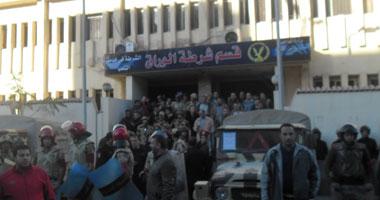
Sameh Ahmad Faraj – Dead as a result of torture in police station
On 15 January 2013, Sameh Ahmed Faraj, 48, went to the local police station to ask about the arrest of one of his employees. His family was shocked to learn that he was killed in a car accident that afternoon.
When his family came to the hospital the very same day, they noticed that he was not wearing the same clothes as when he left in the morning and that he did not have any shoes or socks anymore. They told Alkarama they saw bruises on his wrists and legs, as well as blood on his hands, a cut on the back of his head and on his shoulder blades. They also noticed bruises under his left eye and swelling on his neck.
Witnesses told Sameh's family that he had been assaulted, strangled and beaten all over his body by police officers.
Alaa Farouq, the victim's lawyer, said that he was awaiting the final forensic report to confirm the findings of the initial report, established on 17 June, which stated that there were signs that Sameh Ahmad Faraj was subjected to torture.
On 5 June, Alkarama submitted his case to UN Special Rapporteurs on extrajudicial executions and on torture.
Amr Abdeljayid – Tortured and raped by agents of the general intelligence services at Beni Mazar police station.
Arrested by the general intelligence services next to his home, Amr Abdeljayid, 28, was severely beaten as he was taken to Beni Mazar police station. When he arrived, he learned that he was accused by the General Prosecutor of a robbery allegedly committed on 28 February. During five days, he was tortured without interruption by the chief of the general intelligence services of Beni Mazar.
The victim tried to convince his torturer that he was innocent, in vain. Two officers then came in the room. They blindfolded him, stripped him naked and hung him with his hands tied behind his back to the window so that his feet did not touch the floor. Then, they raped him, put him down and forced him to lick their shoes. Finally, he was severely beaten until he bled and lost consciousness. He was released on 15 March 2013.
On 6 March, Amr Abdeljayid's lawyer asked North Al-Minia's Prosecutor to order a medical examination to demonstrate that the victim was tortured at the police station and that his confessions were extracted under torture. The lawyer, Mohammed Al-Hanboli, confirmed that, to date, no medical report has been established, almost two months after the torture.
The continuing practice of torture by police forces and the impunity of the perpetrators show that the Egyptian authorities fail to show the political will needed to put an end to this practice, despite their obligations according to the Convention against Torture.
